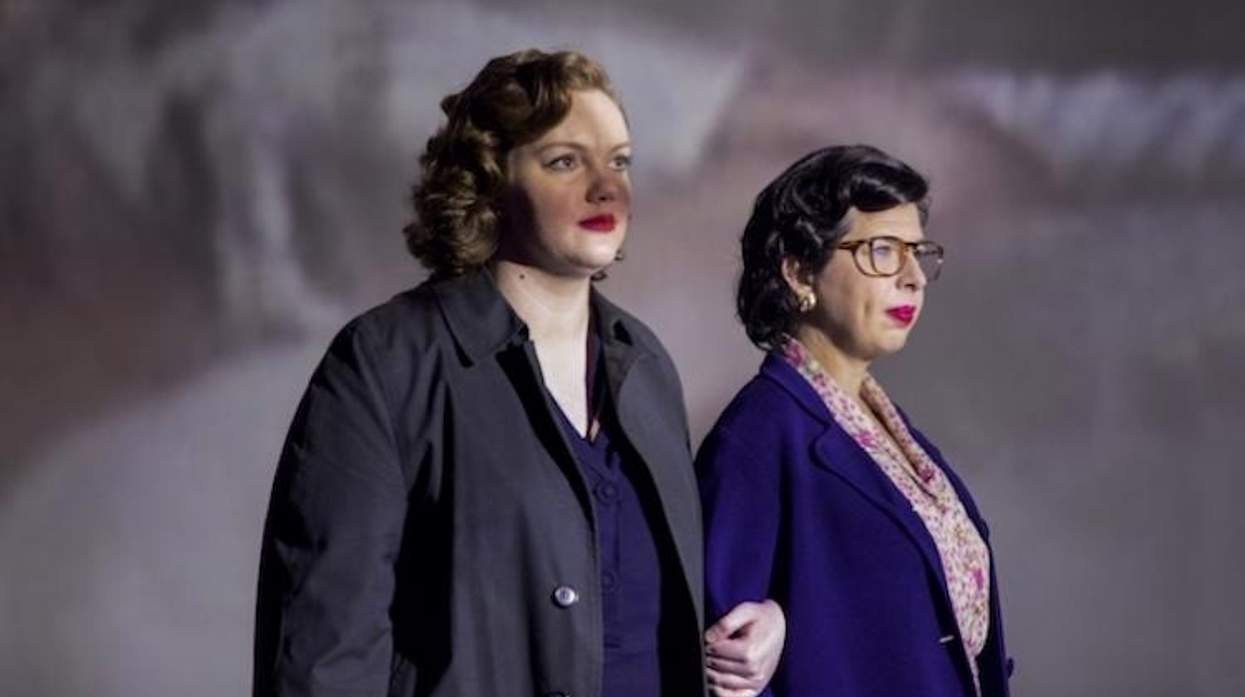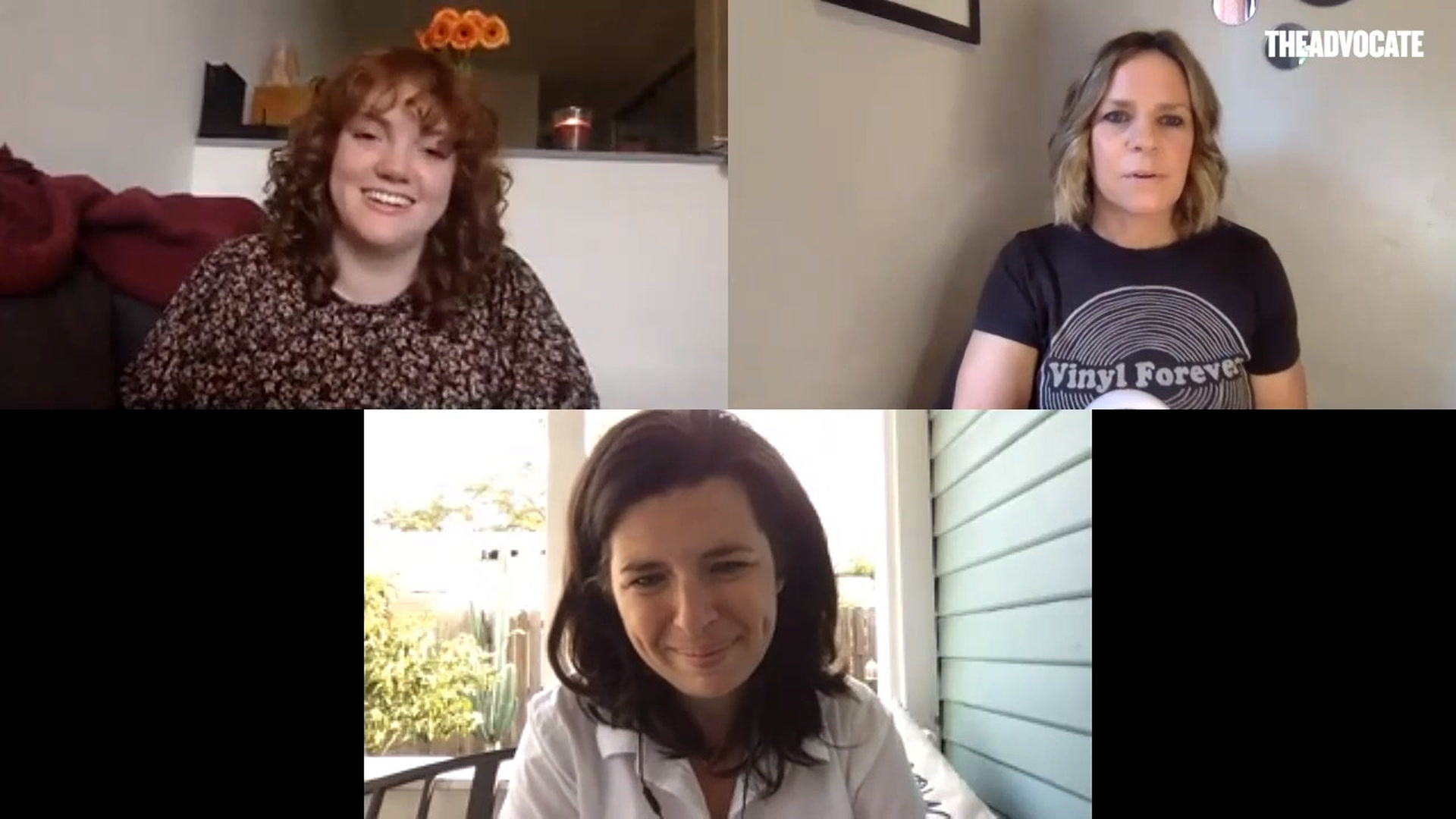The history of the LGBTQ+ civil rights movement in the United States was told in a four-part docuseries Equal during LGBTQ+ History Month on HBO Max earlier this year. The series implemented archival footage, voice-over, and reenactments of events to amplify the voices of those courageous queer people who knocked down barriers for generations to follow.
Among those whose story was told in the first episode were Phyllis Lyon and Del Martin, a lesbian couple who not only fought for LGBTQ+ rights but whose epic love story endures. In a kind of passing of the torch from one generation to queer women that came after Martin and Lyon, out actors Heather Matarazzo (Welcome to the Dollhouse, The Princess Diaries) and Shannon Purser (Riverdale, Stranger Things) play the couple in Equal. And the immense contribution Martin and Lyon made being their authentic selves beginning in the 1950s is not lost on Matarazzo (who came out publicly in the early aughts) and Purser, who came out in 2017.
"It's always lovely to be thought of, especially when it comes to getting to utilizing one's platform to elevate an even bigger platform like Phyllis and her wife as pioneers," Matarazzo, who plays Lyon, told The Advocate in a video interview (along with Purser) this fall.
Lyon and Martin's story is told in an episode of Equal that begins with queer activism in the '50s and the founding of critical LGBTQ+ organizations like the Mattachine Society (Cheyenne Jackson and Anthony Rapp play cofounders Dale Jennings and Harry Hay). After they'd been together as a couple for a few years, Martin and Lyon cofounded the Daughters of Bilitis, the first national lesbian organization in the country. In the early '60s, they began publishing the lesbian newsletter The Ladder.
"I love the idea of their newsletter that they created together," Purser told The Advocate. "The idea of there being this secret little pamphlet that was passed around to queer women, I think is so fascinating. I wish we had more access to what was actually written because I would have loved to go back and read more of that."
For Purser, appearing in Equal and becoming familiar with the queer history that includes the stories of transgender pioneers including Lucy Hicks Anderson (Alexandra Grey), Jack Starr (Theo Germaine), and Christine Jorgensen (Jamie Clayton), was an education.
"It's been so illuminating for me because I realized I knew very few of the people that were being featured in the series," Purser said. "I grew up in a super religious home. Being queer was not accepted or talked about. Since I've been out, in the last few years, I found myself catching up on queer history.
"I was really honored to get the offer [to play Martin]. I think I felt a little bit insecure because I was like, I've only been out for a few years. I'm kind of a baby gay still. And the fact that I get to play this incredibly brave woman who was one of the founders of the queer movement. It was overwhelming but in a really positive way."
The story of LGBTQ+ history is couched in various kinds of love, including loving another despite the barriers and loving one's self enough to honor a queer identity. Matarazzo discussed those elements of Equal.
"Love is love is love is love is love. It doesn't matter if it is taking place in the '50s or the 18th century or 2020. Just that two beings that fell in love with each other and were fighting for their right to exist," Matarazzo said. "I think that is the overall arc of the series is that is love is love is love. Love, I feel we have been conditioned to believe, especially as women, is a word that is very passive soft, very soft, very kind. When, in actuality, love is fierce and that it's hot, passionate."
A star of queer-themed projects including 2004's Saved and The L Word, Matarazzo came out in Hollywood when it was still a relative rarity. But she said she desires never to be "put on a pedestal" for the decision to come out.
"There are countless people whose names we will never know that have been way more courageous than I and have suffered through much greater adversity than I," she said.
Still, even with the work that all of the activists portrayed in Equal to make their lives and those of queer people who came after them safer and more fully lived, Matarazzo was told to remain closeted.
"I look at it as almost a case of the divine fuck-its," she said about coming out when she did. It's like, what are you going to do? There are so many other mechanisms operating behind the scenes in terms of how you present in your professional life, how you present in your personal life, all of these different ways."
"I was getting bombarded by all of these different people within all of these different angles, and I think the straw that broke the camel's back was that there was an older lesbian publicist that I had a tremendous amount of respect for and she told me not to come out. She said that it would ruin my career. She was very adamant about it and almost angry," Matarazzo shared.
"It felt so internally claustrophobic that I couldn't not express that truth," she said, echoing the ethos that so many of the activists depicted in Equal embraced.
Watch the video interview with The Advocate above and watch Equal on HBO Max now.






































































Charlie Kirk DID say stoning gay people was the 'perfect law' — and these other heinous quotes